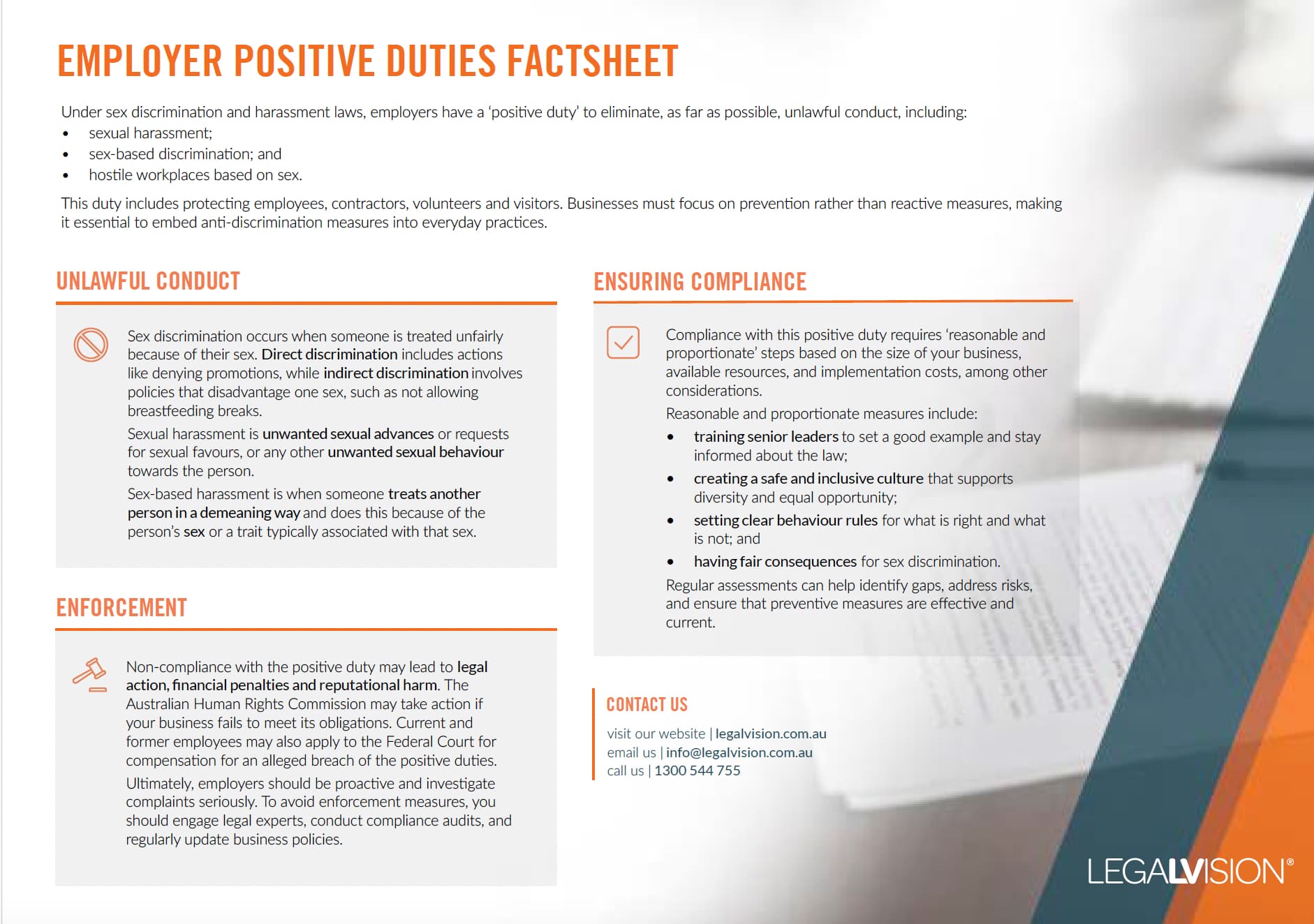In Short
- Age discrimination affects both younger and older employees, leading to unfair treatment and missed opportunities.
- The Age Discrimination Act 2004 (Cth) prohibits age-based discrimination in the workplace.
- Implementing inclusive policies and promoting awareness can help prevent ageism.
Tips for Businesses
Develop clear anti-discrimination policies that address ageism. Provide regular training to staff on recognising and preventing age-related biases. Foster an inclusive culture that values employees of all ages.
According to the Australian Human Rights Commission (AHRC), ageism is a big issue in the workforce. Anti-discrimination laws in Australia have enforced penalties on employers who discriminate based on age in the workplace. However, it can be challenging to understand how to tangibly combat age discrimination.
Age discrimination affects employees of both younger and older ages, and occurs when you:
- treat them less favourably than other employees; and
- do not provide them with the same job opportunities or development.
Such discrimination is unlawful and, as an employer, you should be aware of your obligations to combat age discrimination. This article explains what the AHRC’s report has said and how your workplace can combat this issue.
What Did the Report Say?
The AHRC’s Report had several key findings relevant to the workplace:
- Ageism Exists in Australia: 90% of Australians believe that ageism exists, and 63% have experienced ageism in the last 5 years.
- Ageism Affects Australians of All Ages: Typically, ageism thrives in stereotypes. Young people are ignored or condescended to, middle-aged people can be turned down for jobs and older people are given ‘help’ without asking.
- Stereotypes Concerning Young People: 55% of Australians view young adults positively. Australians view young adults as having a good work ethic with new ideas and a great understanding of technology; however, they are considered to have low financial knowledge and often make mistakes.
- Stereotypes Concerning Middle-Aged People: Middle-aged people are associated with leadership roles and finalising professional success. Additionally, they are considered to be juggling competing priorities.
- Stereotypes Concerning Older People: The report stated that Australians consider older people to have declining skills, agency and vitality and lack competence in certain areas. However, they are considered nice, likeable and warm.
How Can I Avoid Age Discrimination?
Firstly, it is worth noting that the Age Discrimination Act 2004 (Cth) (the Act) exists to ensure people of all ages have the same fundamental rights to equality before the law and to eliminate unlawful age discrimination. Similar protections also apply under state and territory anti-discrimination legislation, with some varying applications.
The Act allows individuals to make a complaint of unlawful age discrimination. The AHRC must investigate these complaints and will usually facilitate a conciliation process in an attempt to settle the matter in dispute. If conciliation cannot settle the matter, a dispute can escalate to the:
- Federal Court; or
- Federal Circuit and Family Court.
As an employer, you also have ongoing WHS duties to comply with, including taking active steps to prevent age discrimination. You, as an employer, should be taking reasonable steps to implement practices within your business to prevent and mitigate risks of age discrimination. There is no set definition for ‘reasonable steps’, however, what may be considered reasonable could include the steps outlined below.

This fact sheet outlines employers’ ‘positive duty’ under sex discrimination laws, highlighting proactive measures to prevent unlawful conduct.
1. Implement Training to Avoid Age Discrimination
Consider training on unconscious bias and how to identify it within the workplace. Training should allow people to understand the benefits of diversity in the workplace and the consequences of discrimination.
It is important to note that as an employer, you may be vicariously liable for the actions of your employees towards other employees. If an employee harasses, discriminates or bullies another employee, and you know that this occurred and did not take reasonable steps to address and mitigate the behaviour, you may be held vicariously liable. This is where training can assist in setting out your business’ expectations and employee behaviour.
2. Draft Anti-Discrimination Policies
Ensure your workplace has a policy that deals with discrimination. Your workplace should be a safe space for all employees; hence, having a policy clearly articulates where your business stands on discrimination.
Your policy should address:
- your stance on discrimination;
- what constitutes discrimination and harassment in the workplace; and
- the consequences of this behaviour.
3. Enforce a Complaints System
Consider a complaints system that allows for complaints to go to supervisors. Additionally, ensure that employees are fairly treated when reporting incidents of age discrimination. Depending on the severity, consider how you will investigate allegations and mediate between the two parties.
Some outcomes of the complaints process can look like:
- conciliation or mediation with an impartial party to reach a mutually accepted resolution;
- counselling;
- a formal apology;
- re-crediting leave taken due to discrimination and harassment;
- official warnings which are on the file of the person who has acted in a discriminatory way; or
- disciplinary action against the person, such as termination of employment, depending on the incident’s severity.
4. Tighten Your Recruitment Process
There are a couple of questions you can ask yourself throughout the recruitment process to help consider any bias against age:
- Are formal qualifications or length of experience essential or just desirable for the job?
- Does the interview involve irrelevant or invasive questions?
- Do you need the applicant’s date of birth in the initial interview?
- Are your interview questions applied consistently throughout all interviews?
Call 1300 544 755 for urgent assistance.
Otherwise, complete this form, and we will contact you within one business day.
Key Takeaways
Ageism exists in the Australian workplace. It can be challenging to understand how to overcome discrimination; however, it is important to take active steps to eliminate age discrimination from your business.
If you are dealing with issues related to workplace discrimination, our experienced employment lawyers can assist as part of our LegalVision membership. For a low monthly fee, you will have unlimited access to lawyers to answer your questions and draft and review your documents. Call us today on 1300 544 755 or visit our membership page.
Frequently Asked Questions
Ageism is when someone unlawfully discriminates against another based on their age.
Legislation exists at federal and state levels, including the Age Discrimination Act 2004 (Cth). This Act prohibits age discrimination in the workplace (and other areas) and allows for formal complaints to be made when age discrimination occurs.
We appreciate your feedback – your submission has been successfully received.












